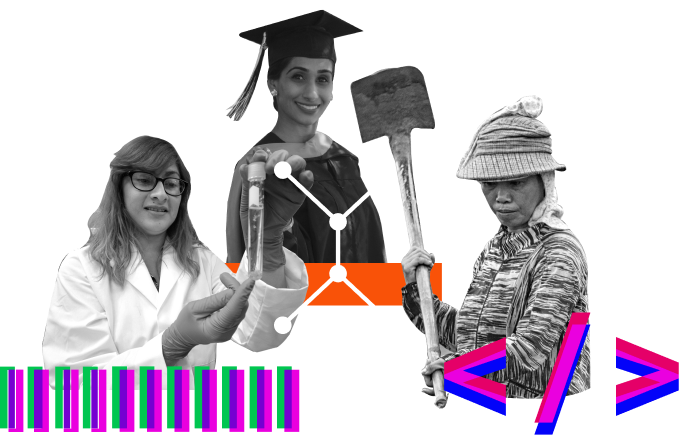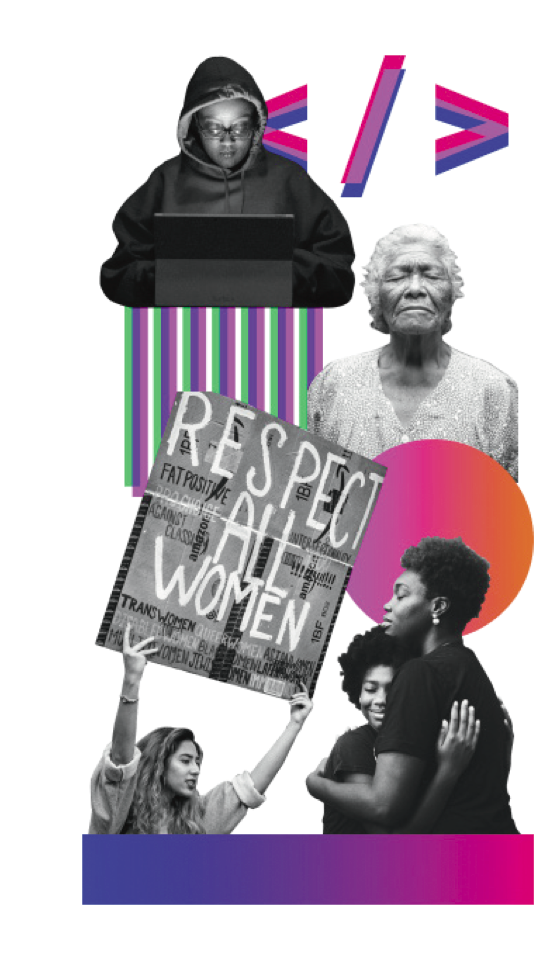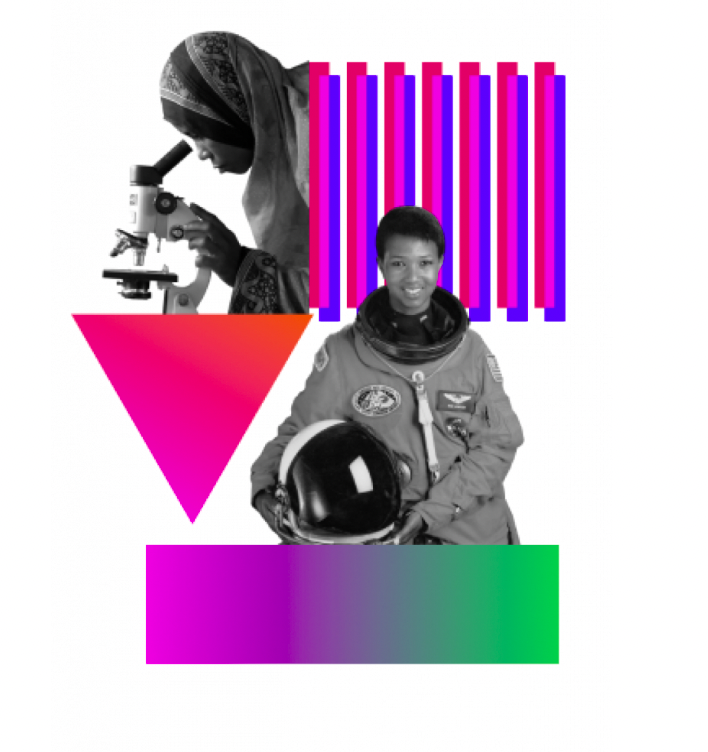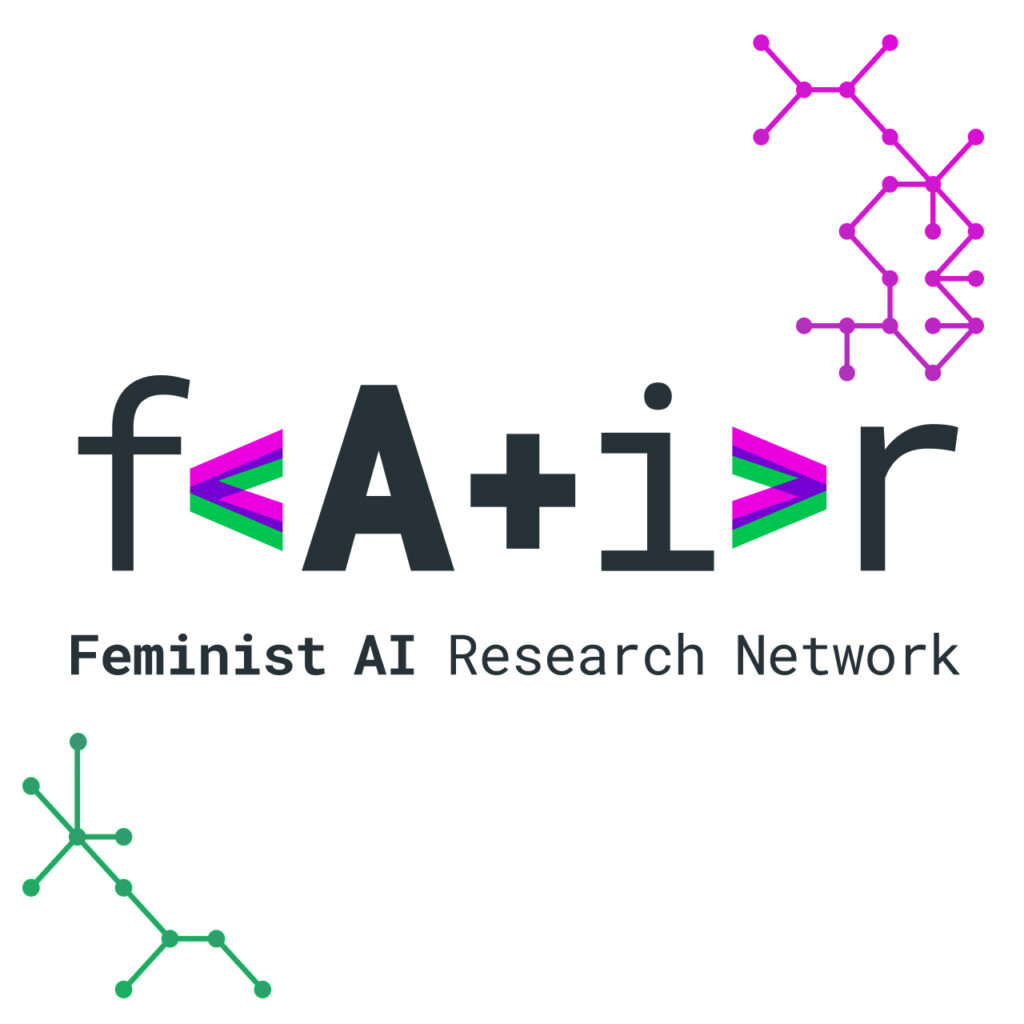Incubating Feminist AI 2021-2024
Our Executive Summary
Goal: The f<a+i>r, Feminist AI Research Network, was created to springboard from descriptions of ‘why’ and ‘what’, to applied research on ‘how’ new Feminist AI and Automated Decision Making (ADM) data, algorithms, models, and systems could concretely and positively impact social / gender justice, improve quality of life, and correct for historic exclusion.
f<a+i>r aims to to create new tools in order to transform old systems. We investigate, validate, prototype and pilot research hypotheses using multidisciplinary teams, design justice principles, meaningful community engagement, and public and private sector partnership aligned with our regional and global approach.
Impact: Over 2021-2024 f<a+i>r has spread the idea of Feminist AI to expand the collective vision beyond critical work on Gender Based Violence (the floor) to a vision of a world where new opportunities abound (the ceiling), and women, girls and marginalized communities are equal partners in decision-taking and tools-making.
Feminist AI: Artificial Intelligence harnessed to deliver equality outcomes, designed with inclusion at the core, creating new opportunities for proactive, innovative correction of inequities.
Quality Research
Using the f<a+i>r paper → prototype → pilot methodology across regions to create multiple pathways multi-stakeholder human rights-based approaches and design justice principles, new multidisciplinary teams of technologists and social scientists collaborated with communities who became an essential part of the co-creation process. This approach enabled ways to make sure the technology meets the needs of women, girls and most marginalized others in vulnerable communities.
Paper ───────────── Prototype ────────────── Pilot
9 stand alone papers funded:
- Inclusive Public Policy Design for Data Science Projects (Mexico)
- Analyzing Public Procurement Anomalies with a Gender Perspective (Ecuador)
- Work Related Diseases: An Annotated Corpus to Evaluate Sex Differences (Chile)
- Reimagining Automated Violence Interventions & Participatory Technology Design (India)
- Gendered language sets in Thai’s service sectors (Thailand)
- MENA Languages & Feminist Data: Towards Building Feminist AI Tools (Egypt)
- Preventing Child Marriage: Incubating Evidence-based Policy & Advocacy Approaches (Indonesia)
- Trafficking in the ASEAN Region: Trauma-informed digital connections to legal services for trafficking survivors (Thailand)
- Compost Engineers and their slow knowledge (Brazil)
4 papers → prototype conceived:
- La Independiente: Mainstreaming Gender Perspective in AI Crowd Work in the Global South (Mexico)
- Towards a feminist framework for developing AI: from principles to practice (Chile)
- Community Perspectives of AI in Natural Resource Governance (Mexico)
- Explainable AI-Based Tutoring System for Upper Egypt Community Schools (Egypt)
5 papers → prototype → pilot created:
- SafeHer Transit: What Women Want in their AI-Powered Safety App (The Philippines)
- E.D.I.A. A tool to explore natural language processing software to identify biases and stereotypes (Argentina)
- AymurAI: Measuring Gender Based Violence in Latin America (Argentina)
- SOF+IA: GenAI chatbot to dialogue and address situations of violence and digital harassment that women, of any age, often experience on digital social media platforms. (Chile)
- AI & Equality: A Human Rights Toolbox, Course & Community
Projects from the 3 Regional Hubs of Latin America, Middle East North Africa, and SouthEast Asia from 10 Countries: Argentina, Brazil, Chile, Ecuador, Egypt, India, Indonesia, Mexico, the Philippines and Thailand.
Globally recognized including: ACM Conference on Equity, Responsibility and Transparency (FAccT); International Economic Forum of the Americas; International Association for Feminist Economics; Conference on Cultures and Languages Across the Curriculum (CLAC); Internet Governance Forum; UN Commission on the Status of Women; best research paper HCAI Education and Practice 2023 Conference: “Generative AI-Based Tutoring System for Upper Egypt Community Schools” by Marwa Soudi, Esraa Ali, Maha Bali and Nihal Mabrouk.
f<a+i>r pilots
Fostering new forms of multidisciplinary AI thinking and teamwork, catalyzing new knowledge creation, validating most promising f<a+i>r research hypotheses and proof of concept to pilot the most effective prototypes with new partnerships that actively innovate, and correct for historic inequities and sustainability.
SafeHER is an AI-driven transit safety app for Manila, a city with one of the most dangerous transport systems in the world for women as 80% of women commuters report harassment or sexual assault. Developed by a philosophy professor and her tech team, SafeHER merges defensive functions with women’s collective action. It also integrates an active cooperation with Manila transit authorities AND government units.
- Published in the peer reviewed Journal of Transportation Security by Springer, Biana, H.T., Jabar, M., Yabut, H. and Domingo, R., 2023. Modified feminist self-defense: violence against women in transit in Metro Manila. Journal of Transportation Security, 16 (1), p.11., the project has the potential to replicate in other densely populated urban settings.
- In collaboration with the Philippines’ Violence Against Women public desk, and the Philippines Commission on Women; for the pilot stage the team conducted successful simulations with local Manila police. Going forward De La Salle University will adopt the app and mainstream it for their female students.
In Argentina two female computer science professors from University of Cordoba teamed up with Via Libre, a storied Buenos Aires NGO to create a tool to explore natural language processing (NLP) software in order to identify biases and stereotypes. The team’s paper Bias assessment for experts in discrimination, not in computer science. was accepted In Proceedings of the First Workshop on Cross-Cultural Considerations in NLP (C3NLP) (pp. 91-106), Alemany, L.A., Benotti, L., Maina, H., Gonzalez, L., Martínez, L., Busaniche, B., Halvorsen, A., Rojo, A. and Rajngewerc, M., 2023, May.
- A fast moving tech environment became an actor in the evolution of the tool. Prior to the prototype phase, only auditing through single word detection was possible. But 6 months later, in the 2022 prototype phase, contextual detection and inspection of bias, as well as intersectional analysis, became possible. The team built and shared their prototype on hugging face allowing users to define the type of bias they wished to explore and to understand bias through an intersectional analysis by considering two binary dimensions, such as female-male intersected with fat-skinny.
- In the pilot phase the team is further democratizing the tool, broadening reach by training 500 Argentine high school teachers to use and teach the tool in their classes. The goal: community-centered methods to build a language dataset which represents stereotypes in Argentina. E.D.I.A. replication in other languages and contexts are planned with the co-creation of structured content and teaching materials.
- E.D.I.A received the prestigious Mozilla Data Futures Lab 2024 Infrastructure Fund Award, In addition to f<a+i>r pilot funding.
Measuring Gender Based Violence in Latin America, a collaboration between feminist NGO Data Género and Criminal Court 10 in Buenos Aires, Argentina. AymurAI is a software that anonymizes documents, collects and makes available data on gender violence from judicial sentences. AymurAI’s long term goal is to offer access to artificial intelligence technologies that allow the automatic extraction of statistical data on gender violence and improve transparency in the judiciary in Latin America.
- The paper mapped out the theory, and the prototype involved a collaboration with a judge and staff running Criminal Court 10 in Buenos Aires in order to easily open their data to document and make public the high rate of femicide.
- AymurAI is now a case study in UNESCO’s Global toolkit on AI and the rule of law for the judiciary.
- AymurAI received funding from the McGovern Foundation to continue beyond the f<a+i>r grant to expand and deploy the project to more criminal courts in Argentina, in Mexico and beyond.
f<a+i>r Regional Hubs
The decentralized Hubs have played the role of critical connectors by socializing feminist AI concepts across projects and collaborators in their respective regions. Uniquely strengthening the capacity of regional actors, building a field of inter- and intra-regional multi-disciplinary teams, deepening understanding of each region’s distinctive needs, the Hubs leverage learnings on collective solutions, and nurture the roots of Feminist AI in the global south.
- Latin America & the Caribbean: Tecnológico de Monterrey led by Professor Paola Ricaurte Quijano
- South East Asia: Chulalongkorn University led by Professors Soraj Hongladarom / Supavadee Aramwith
- Middle East & North Africa: Access to Knowledge for Development Center (A2K4D), at the American University in Cairo’s School of Business led by Professor Nagla Rizk.
The three hubs operate as distinct entities, each bringing unique perspectives and approaches to the landscape of feminist thought and praxis. Despite separate viewpoints and methodologies they have succeeded collectively at unifying diverse approaches to build a groundbreaking feminist movement. Through the collective effort, the new concept of feminist AI was advanced in a way that honors and leverages the rich vocabularies and schools of thoughts within the network.
About The Alliance and the fa+ir network
The <A+> Alliance is a global feminist coalition of technologists, activists and academics with a mission to create a paradigm shift for AI and associated Automated Decision-Making to a focus on systems change in support of inclusive democratic processes and gender transformative policy and structures. It is dedicated to creating a new body of feminist AI knowledge and models with and from the global South.
In 2020, with the support of IDRC, the <A+> Alliance launched f<a+i>r the Feminist AI Research Network to build upon <A+> Alliance’s 2019 Declaration for Affirmative Action for Algorithms which has served as a mothership for the process. Co-founded in 2019 by Women at the Table and Ciudadania Inteligente, the Alliance has been led from 2021-2024 by Women at the Table & Tecnologico de Costa Rica.

Lessons Learned
- Baseline on Feminist AI Since no one knows what Feminist AI is, and as it can and could be many things to many people, the baseline concepts of gender justice, JEDI, Design Justice, all need to be shared. The inclusion of workshops for prospective/new grantees on intersectional, feminist issues proved essential to develop a common vision, train AI developers on feminist principles and create the foundation for systematizing learnings from previous cohorts on methodologies : Community Engagement principles are critical for teams to be able to ideate and create Feminist AI as a multidisciplinary approach as team members are coming from different perspectives with different vocabularies.
- Genuine Community involvement Community engagement is sine qua non to this process: More research could be done on how to effectively reach out to and then create and validate methodologies to fully and meaningfully engage communities in the co-creation of new and emerging technologies that serve the needs of the community and the most marginalized.
- Bi Weekly meetings proved to have great impact encouraging teams to move forward in the compressed timeline, avoid less useful avenues of investigation and produce highly regarded research published in global journals, presented at prestigious conferences, and garner further funding from the institutions such as McGovern Foundation, Mozilla, etc : Bi Weekly meetings not only built trust but also strong relationships within the larger network, transforming grantor-grantee relationships into a critical community of researchers and technologists that value collaboration and bold experimentations.
- Creative freedom for researchers is key and the close alignment with expressions of interest into papers, prototypes and pilots allowed for researchers to make significant progress vis à vis the bi weekly meetings on one hand, and to have the freedom to experiment, ideate and pivot their means and methods on the other hand.
- Funding Not every project prototype or pilot needs the same amounts of funding. A more effective method was found in Cohort IV when funding was linked to fully formed prototype / pilot work plans and budget. Some projects needed more funding to be effective, others less.

Recommendations
Engagement and advocacy:
- Build on the momentum of the validated paper – prototype- pilot methodology
- Give visibility to the utility of the technologies built
- Showcase the network’s feminist AI research, tools, frameworks and debate to a wider audience
- Expand the Global Directory through a dedicated global communication campaign, highlighting the groundbreaking work undertaken by feminist leaders in the global majority, to allow the community to build partnerships across the world.
- Increase the capacity of the global coordination team with a new further emphasis on African and Asian talent and practitioners.
- Enhance introduction of feminist AI with humanities, gender, social protection, and policy communities.
- Continue to socialize gender-transformative approaches and feminist AI to technical and computer science communities.
- Be sensitive to the reality that academics are rewarded when they publish in their specific discipline’s journals. Be aware that multidisciplinary approaches are not highly rewarded currently. This is a continuing obstacle.
Partnerships, Collaborations and Capacity Building:
- Continue offering modules about technical concepts and terminologies to interdisciplinary teams (In addition to SAC innovation social science capacity building workshops). This would support teams’ to develop the prototype proposal, and embark on the prototype development phase.
- Develop the AI & Equality Human Rights Toolbox, further tailoring it to specific regional contexts, p.ex, African context with ground examples and experiences. The latter can work alongside the Africa outreach strategy and build further on the learnings and outcomes from the Incubating Feminist AI grant.
- Systematize informal and formal meetings with relevant institutions and boundary partners. This may set the grounds for co-creation to involve the partners identified in the original Incubating Feminist AI proposal (e.g. trade unions, municipalities, national commissions); and to present solutions (Digital Public Infrastructure work may be one such collaborative opportunity).
Outreach and funding:
- Open opportunities for funding further papers, prototypes and pilots with interdisciplinary outlooks and approaches. Explore multiple publishing avenues and formats: peer-reviewed articles, op-eds, news articles, and creative essays in addition to podcasts and webinars. It’s important for the network to exist beyond the academy, and to socialize its jargon and approach to developing feminist technologies with communities that can benefit.
- A broader grassroot and outreach to policy makers, feminists, digital rights and activists, human rights defenders, critical and responsible AI institutions will build visibility and generate new partnerships with researchers, civil society, and government stakeholders.
- widen the dissemination of knowledge to showcase the network’s applied research, and debate to a general public audience. To do this, the network may consider funding a communications strategy/campaign.


